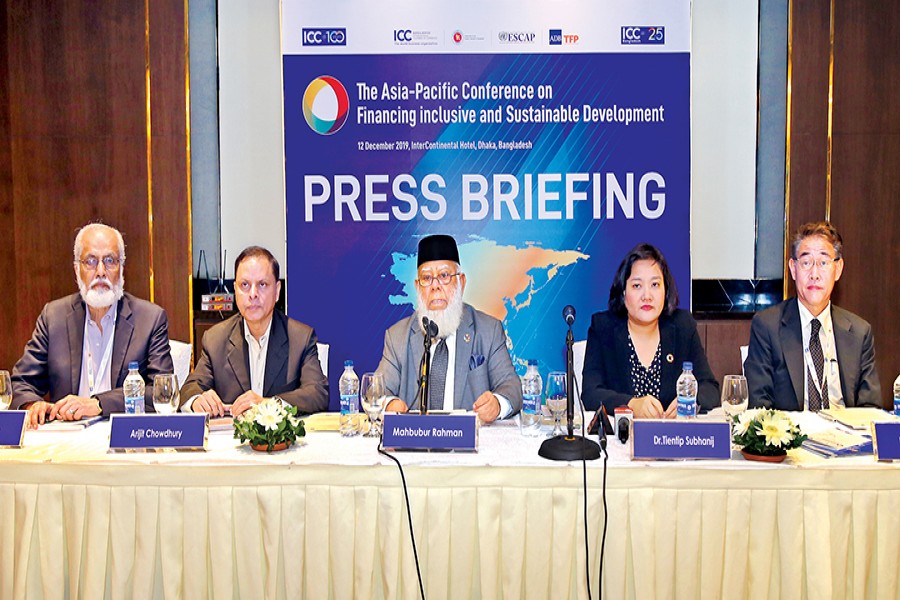'Public-private linkup' to help bridge SDG financing gap
Three-day ICCB conference concludes

Published :
Updated :

Effective partnership with the private sector can help the government lessen the financing gap for achieving sustainable development goals (SDGs), said Mahbubur Rahman, president of International Chamber of Commerce, Bangladesh (ICCB), in the city on Thursday.
He was speaking at a press briefing after conclusion of the three-day Asia-Pacific Conference on Financing Inclusive ad Sustainable Development at a city hotel.
Mr Rahman termed the huge financial requirement for achieving SDGs a big challenge for each of the countries in the region as US$ 1.5 trillion is required annually.
"Funding arrangement from the private sector is only possible through revenue generation and partnership and the government should create the atmosphere by encouraging the private sector to come in," he said while responding to a question.
The president of the local chapter of the International Chamber of Commerce (ICC) said the government has set up the office of public-private partnership (PPP) but unfortunately it has not been growing at a pace that is required.
"It needs to be accelerated and expanded because we don't have alternatives and the time is running fast. Almost one-fourth of the time for doing the critical task has already been spent," he said.
"Without partnership between the government and the private sector, it will be impossible to bring a substantial change in the short period of time. It has to be done together," he underlined.
According to the government estimate, Bangladesh requires US$66 billion per annum for the purpose of achieving the SDGs.
Talking about the possible sources of investment at the closing session, Hamza Ali Malik, director of microeconomic policy and financing for development division of the ESCAP, said lots of the required investment can be garnered by effectively using available resources.
Highlighting the issue of governance, he said ESCAP data showed that the country that performs better on governance can spend fiscal resources much more efficiently.
"We also find that public expenditure efficiency is the key to making revenue investment sustainable," he added.
ICCB vice-president Rokia Afzal Rahman said the speakers throughout the discussions recommended regulating and mobilising financial resources, policy reforms, boosting private investment, access to finance, regular training and long-term action plan.
She also focused on financial inclusion and capacity building of both the government and the private institutions.
Moderating the closing session, senior secretary of the Financial Institutions Division under the Ministry of Finance Md Ashadul Islam said the government is developing a national strategy for financial inclusion and the conference helped them giving the much-needed inputs for the initiative.
"Financial inclusion is very important because it is very difficult to achieve sustainable development without financial inclusion," he said.
David Morrish, global head of trade and transaction banking, London Institute of Banking and Finance (LIBF), and Steven Beck, adviser and head of the trade finance at Asian Development Bank (ADB), among others, also spoke at the session.


 For all latest news, follow The Financial Express Google News channel.
For all latest news, follow The Financial Express Google News channel.